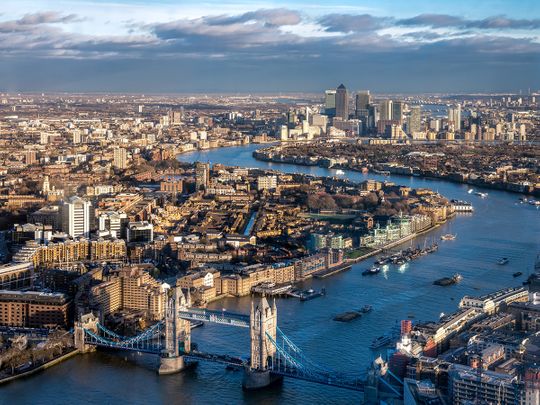
House prices across Britain are on track for their longest stretch of improving affordability in more than two decades, opening the way for more people to grab a rung on the property ladder.
The trend reflects forecasts for rising wage growth and a stagnation or even slump in house prices, which would give consumers more purchasing power.
The outlook, if it pans out, would be a double-edged sword for Prime Minister Rishi Sunak's Conservative government as it gears up for a general election next year. While a house price slump would anger traditional Tories who are more likely to own property, younger voters are concerned that high mortgage costs and purchase prices leave owning a place increasingly out of reach.
"Households should be in a better place to capitalize on the improvement in affordability, given the fact we expect real incomes to tick up over the next year or so," said Gabriella Dickens, senior UK economist at Pantheon Macroeconomics.
Small dent in house prices
The forecasts round out a year in which the average house price fell 1.8 per cent to 257,443 pounds, according to figures published by Nationwide Building Society on Dec. 29. That drop is much less severe than the 10 per cent plunge economists had forecast last December for this year. In real terms - accounting for inflation - they're down 11 per cent.
The dip over the past year puts a small dent in the surge in house prices since the start of the pandemic. By Nationwide's estimate, prices are still 20 per cent higher than they were at the end of 2019, just before the coronavirus hit the UK.
Property prices have held up better than expected due to a shortage of places on the market and a stabilization in borrowing costs after the Bank of England pushed its benchmark lending rate to the highest since 2008.
Looking ahead
For the year ahead, most forecasters are expecting only a moderate drop in house prices of zero to 2 per cent. A survey by Bloomberg showed Oxford Economics was the most pessimistic, anticipating a 4 per cent drop. But that's much better than last year's outlook for declines of twice that pace or more.
While house prices are set to stagnate, wages are racing ahead. Average total earnings are forecast to rise by 7.1 per cent between the fourth quarter of 2022 and 2023, 4 per cent in the 12 months to the fourth quarter of 2024, and 2.5 per cent the following year, Bloomberg Economics predicts.
The continued rise in pay over 2024, fueled by a tight labor market, will go some way to putting more money in people's pockets. It's a factor that may prevent the sort of crash in house prices the UK suffered in the early 1990s. Forecasts for the coming years now suggest the longest stretch of wages out-pacing house prices since the start of the century.
"It appears likely that a combination of solid income growth, together with modestly lower house prices and mortgage rates, will gradually improve affordability over time," Nationwide Chief Economist Robert Gardner said. "If the economy remains sluggish and mortgage rates moderate only gradually, as we expect, house prices are likely to record another small decline or remain broadly flat."
Even so, many economists still see UK homes as overvalued. There's currently a 10 per cent gap between the price of a property in the UK and what economic fundamentals can justify, according to analysis from Bloomberg Economics' Niraj Shah.
Attracting younger people to buy homes
Those figures are a concern to younger voters including millennials - the first generation which isn't becoming more conservative as it ages, according to some studies - who are struggling to get a foot on the housing ladder.
In a sign of just how much the Tories are trying to woo younger people, Housing Minister Michael Gove told the Times in a recent interview that the government was considering a number of housing measures for its manifesto. Those may include a program to provide support for longer fixed-term mortgages, reducing the size of deposit needed, and a revival of the Help to Buy program.
The outlook for housing affordability is in step with other indicators showing a let-up in a searing cost-of-living crisis that gutted household spending power since the pandemic. The biggest jump in inflation in three decades outpaced wage growth for much of the past two years. The situation has now started to reverse.
Still, there's little evidence that nominal house prices will fall sharply. With unemployment only marginally above a record low and wages growing, there's not a growing pool of people bailing out of properties they can no longer afford.
"Forced sales have been contained compared to past downturns, given the historically low unemployment rate and mortgage regulation encouraging banks to repossess only as a last resort," Shah said. "At the same time, healthier balance sheets and a high number of fixed-rate mortgages are insulating households and providing time to adjust."
His expectations for a benign year ahead are shared by several other housing market experts.
"The rapid pace of growth in average wages, alongside flat or declining house prices, has led to a significant fall in the ratio of house prices to average earnings, improving affordability in that respect," said Martin Beck, chief economist of forecasting group the EY ITEM Club.
Interest and mortgage rates
Of course, for anyone buying with a mortgage, affordability will also depend on the prevailing interest rates and availability of debt. Mortgage rates have shot up since the Bank of England began hiking its base rate in December 2021, and around 1.6 million people will feel that pain when their mortgage deals end in 2024 and they are forced to refinance, according to banking industry trade body UK Finance.
Mortgage rates are still three times higher than during the aftermath of the pandemic in 2021, Gardner said.
"As a result, housing affordability has remained stretched. A borrower earning the average UK income and buying a typical first-time buyer property with a 20 per cent deposit would have a monthly mortgage payment equivalent to 38 per cent of take-home pay, well above the long-run average of 30 per cent."
But Beck said the steeper-than-expected fall in inflation over the last few months could lead the Bank of England to cut its base rate more speedily than policy makers are currently suggesting. Markets are already pricing in 1.5 percentage points of cuts over the course of 2024.
Andrew Wishart, at Capital Economics, thinks the peak-to-trough fall in house prices will extend from around 4 per cent now to 6 per cent.
"We think that mortgage rates will hover around 5 per cent until mid-2024 which, combined with the economy slipping into recession and a modest increase in unemployment, might lead to some further slight house price falls," Wishart said.
But given the resilience the housing market has displayed this year, he did not discount the possibility that prices could hold up better than expected in 2024 too.
All of this means first-time buyers should be in a better place to get a foot on the property ladder, according to home search portal Zoopla. It thinks 40 per cent of movers over the next two years will be first-time buyers.
"The rapid growth in rents continues to motivate this group "- average rents have risen faster than average mortgage repayments over the last 3 years," Zoopla said in a report.








